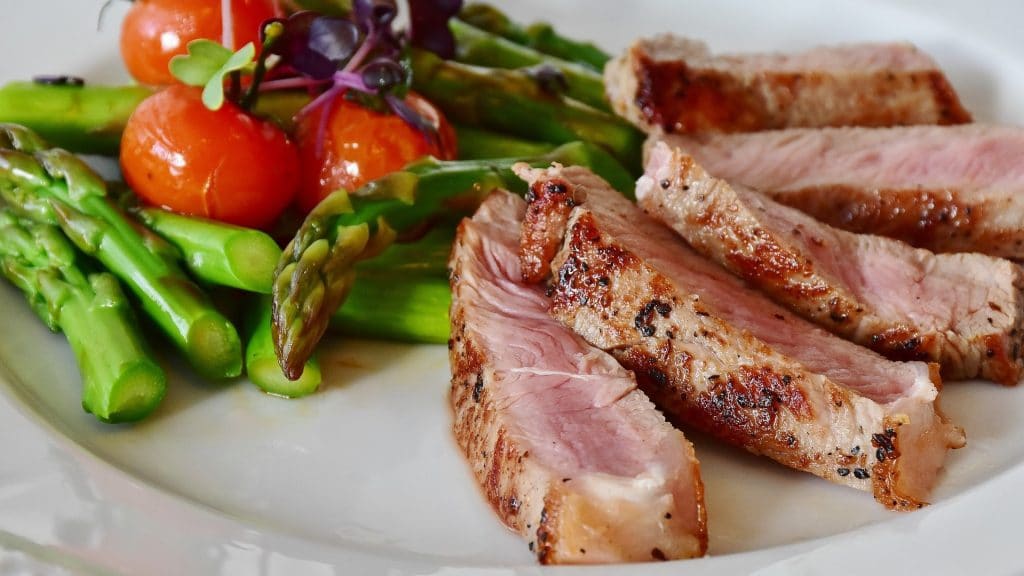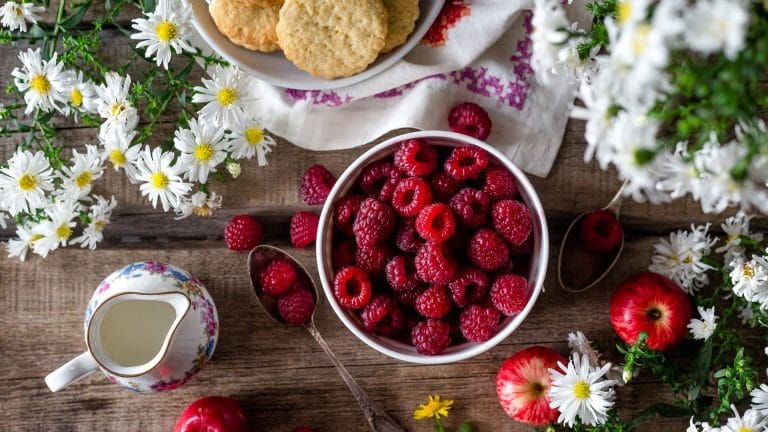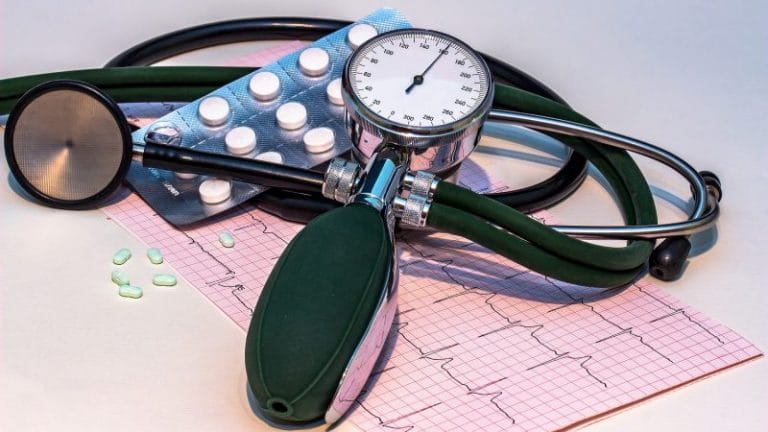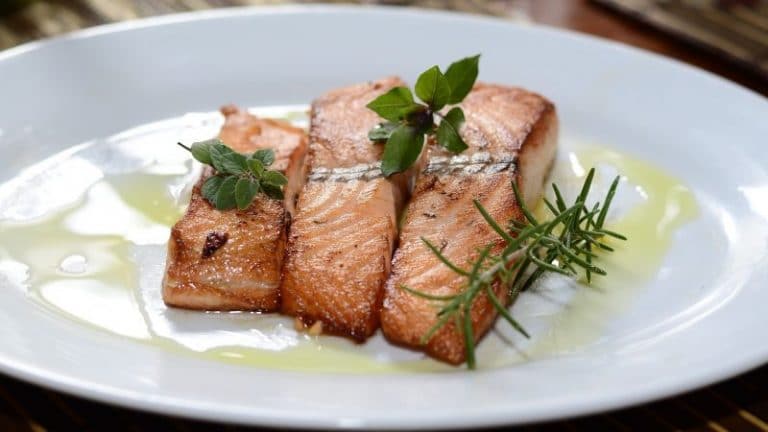25 Vitamin B2 Foods Essential for Your Well-Being in 2024

Vitamin B2, also known as riboflavin, is one of eight B vitamins. Notably, it plays a significant role in enzyme reactions that activate other vitamins, and it takes part in energy production, just like other B-complex vitamins.
The guide below will give you more information about the nutrient, along with the list of the most critical vitamin B2 foods. In other words, you’ll get to discover what you should introduce to your diet to feel good and stay healthy.
What Is Vitamin B2?
Riboflavin is a water-soluble vitamin carried through the bloodstream. To put it differently, the body doesn’t store this type of vitamin, excreting all excess amounts in urine. Following that, you have to include foods high in riboflavin in your everyday diet.
Generally speaking, vitamin B2 is a component of two coenzymes (flavin mononucleotide and flavin adenine dinucleotide). The two coenzymes have essential roles in the metabolism of fats, drugs, and steroids. They also play an important part in energy production in the body.
Vitamin B2 Benefits
Along with thiamine (vitamin B1), riboflavin breaks down carbohydrates, proteins, and fats. It also partakes in the production of ATP (adenosine triphosphate). ATP is the body’s energy source for all vital processes. Another riboflavin function is contributing to the production of red blood cells. By stimulating antibody production, the vitamin helps strengthen the immune system.
Riboflavin benefits also include the absorption and activation of folic acid, iron, vitamin B1, vitamin B3, and vitamin B6. Another perk is that vitamin B2 enables adrenal glands to produce hormones. Also, with the help of vitamin A, it helps maintain a healthy liver, skin, and hair.
According to some studies on vitamin B2, migraine can be prevented with high-dose riboflavin treatment. Normal fetal development depends on this vitamin as well.
Riboflavin Foods
Riboflavin can be found in various foods, but meats, eggs, and dairy products are exceptionally high in this nutrient. Vitamin B2 is also often added to certain types of food, like grains and cereals.
Sadly, a lot of riboflavin content is lost when you boil food because vitamin B2 is soluble in water. Therefore, it’s better to prepare foods with the nutrient differently, for example, by grilling or steaming.
Below you can find a list of healthy foods that you should include in your diet to prevent vitamin B2 deficiency diseases and enhance your overall well-being. Let’s dive right in.
Beef
Beef is among the most valuable riboflavin food sources. Namely, three ounces of beef tenderloin will provide you with 31% of the vitamin’s daily value (DV). Beef liver is even better, with three ounces of pan-fried liver supplying 201% of the DV.
Pork
Another type of meat that has a high vitamin B2 content is pork. As a matter of fact, three and a half ounces of lean pork chop cover about 21% of the vitamin’s DV. Furthermore, pork is a source of zinc, iron, selenium, phosphorus, protein, and B vitamins, such as niacin and thiamine. As it is high in protein and abundant in minerals and vitamins, lean pork is a neat addition to your diet.
Chicken
Chicken is also included in the foods with riboflavin. Notably, if you eat three ounces of Rotisserie chicken, breast meat only, you will cover about 15% of the riboflavin’s DV. Moreover, chicken is a great source of vitamin D, calcium, zinc, iron, and it has trace amounts of vitamins C and A.
Salmon
With three ounces of pink, canned salmon, you’ll cover 11% of the vitamin’s DV, making salmon a valuable B2 vitamin food. This type of oily fish also belongs to foods with vitamin B3.
What’s more, it is an excellent source of vitamin B5, vitamin B1, and vitamin B6. On top of that, you can turn to salmon as it is a rich source of vitamin B12. In addition, salmon’s healthy nutrients are crucial for your bodily functions, like keeping nerve and blood cells healthy and even making DNA.
Cod
Cod is yet another invaluable addition to the list of riboflavin foods. Namely, three ounces of Atlantic cod (cooked with dry heat) covers around 8% of the vitamin’s DV. It is also a good source of protein. In other words, it should be your go-to if you want to improve your heart health and lower the fat intake.
Trout
Trout is another oily fish making it to the vitamin B2 food sources. In fact, a 3.5-ounce serving of cooked trout covers around 7% of the vitamin’s DV. So not only does this freshwater fish offer vitamin B6, but it is also a great source of numerous minerals, including selenium and potassium.
Clams
A 3-ounce serving of cooked with moist heat, mixed-species clams lands you 22% of the vitamin’s DV. That places clams high up on the list of riboflavin foods. Being rich in iron and omega-3 fatty acids, they are incredibly healthy, mainly because they are mercury-free seafood. Moreover, they contain other minerals and vitamins such as vitamin A, selenium, and potassium.
Blue Mussels
A 3.5-ounce serving of blue mussels (cooked with moist heat) lands you 25% of the vitamin’s DV. Besides being a valuable addition to vitamin B2 foods, blue mussels are rich in other B vitamins and essential minerals, such as magnesium and iron. Like other shellfish, mussels are an excellent source of omega-3 fatty acids. They lower blood pressure, keep your heartbeat regular, and help blood vessels work properly.
Dairy Products
Dairy products are riboflavin-rich foods. For example, one cup of fat-free, plain yogurt will cover 40% of the riboflavin’s DV. What’s more, a cup of milk (3.7% milkfat) covers 24%, a 3-ounce serving of Swiss cheese covers 15% of the vitamin’s DV. What’s more, dairy products are a great source of vitamin B12 and vitamin B1.
Portobello Mushrooms
Portobello mushrooms are an excellent riboflavin food source. Fat-free and low in calories, they provide many nutrients. For instance, one cup of mushrooms covers about 27% of the riboflavin’s DV. In addition, these mushrooms are rich in copper and selenium.
Eggs
What is the best source of vitamin B2? Eggs may be the correct answer. For example, if you eat one serving of scrambled eggs, it will land you 18% of the vitamin’s DV.
Eggs are highly nutritious as they contain numerous vitamins and minerals. In fact, not only are they the best source of riboflavin, but they are also a rich source of vitamin B12 and selenium.
Muscadine Grapes
With a 3.5-ounce serving of these grapes, you get 88% of the recommended dietary allowance (RDA) of riboflavin. In other words, muscadine grapes are one of the most vitamin B2-rich foods. Moreover, they are packed with fiber. On top of that, these grapes are a great source of manganese, one of the essential antioxidants.
Apples
One large apple with skin will provide you with 8% of the riboflavin’s DV, making this fruit a good vitamin B2 food source. Furthermore, apples are loaded with vitamin C and fiber. Potassium is yet another nutrient you will get by eating apples.
Avocados
Avocados are great foods high in vitamin B2. More specifically, you will cover 10% of the vitamin’s DV with three and a half ounces of avocado. The fruit also contains other B vitamins, such as vitamins B5, B6, and B9. What’s more, these vitamin B2 fruits are rich in vitamin E, vitamin C, and vitamin K. In addition, this fruit is an excellent source of potassium and copper.
Purple Passion Fruit Juice
Passion fruit is a good source of a range of vitamins, with vitamin B2—riboflavin—being one of them. As a matter of fact, one cup of the juice covers 19% of the riboflavin’s DV. Besides being a vitamin B2 source, passion fruit supplies vitamin C and vitamin A, which act as antioxidants.
Spinach
Spinach is a green, leafy vegetable packed with vitamins and minerals. In addition to being a rich source of vitamins A, C, and B9, it belongs to vitamin B2 sources. Astoundingly, one cup of raw spinach covers 8% of the riboflavin’s DV. As for its perks, spinach lowers blood pressure and may also reduce the chances of developing heart disease.
Kidney Beans
Kidney beans contain a range of vitamins and minerals. Since one cup of canned kidney beans covers 8% of the vitamin B2’s DV, this type of legume is considered a food high in riboflavin. Among other nutrients provided by kidney beans are vitamin B9, iron, and magnesium. Kidney beans are also a rich source of protein and fiber.
Tomatoes
Tomatoes landed themselves a spot among vitamin B2 foods, too. Half a cup of canned and crushed tomatoes covers 8% of the vitamin’s DV. Furthermore, tomatoes provide you with numerous health benefits, such as a lowered risk of heart disease and cancer.
Asparagus
Asparagus is one of the excellent vitamin B2 foods sources, as one cup of it provides 19% of the vitamin’s DV. Being rich in vitamins K, C, A, and B9, this veggie can help you reap several health benefits, like regulating your cholesterol and supporting the work of your stomach and intestines.
Cereals
Fortified cereals lower the risk of nutrient deficiencies. One serving of breakfast cereals, fortified with 100% of the DV for vitamin B2, can fully cover your recommended dietary allowance. In addition to the impressive riboflavin dosage, cereals’ content might boast many other vitamins. That said, be wary of added sugar.
Oats
Oats are yet another riboflavin-rich food. What’s more, they are rich in many other vitamins and minerals, including manganese, phosphorus, and copper. Now, one cup of instant, fortified, cooked with water oats covers 85% of the riboflavin’s DV.
Quinoa
Another riboflavin food is quinoa. A cup of cooked quinoa provides you with 15% of the vitamin’s DV. Apart from being a delicious food with riboflavin, quinoa is rich in fiber. All in all, it’s an excellent choice for people with elevated cholesterol and blood sugar levels.
Almonds
Almonds have many health benefits as they are an excellent source of many vital nutrients. Astoundingly, one cup of whole almonds covers 85% of the riboflavin’s RDA. Apart from being go-to foods that contain riboflavin, these nuts are also abundant in vitamin A and calcium.
Bread
Three ounces of any bread will land you 8% of the riboflavin’s DV, making bread a valuable addition to B2 riboflavin foods. What’s more, it has many health benefits, especially its sprouted and whole-grain varieties. Namely, certain types of bread are packed with dietary fiber and can boost folic acid.
Bagel
Bagels are also B2 riboflavin foods. More specifically, one plain bagel offers around 15% of the vitamin’s DV. Additionally, whole grain bagels may help balance blood sugar, prevent disease, and support healthy digestion. Believe it or not, research suggests that 2–3 servings of a whole grain product a day may prevent chronic illnesses.
Vitamin B2 Recommended Daily Intake
The Food and Nutrition Board (FNB) at the Institute of Medicine of the National Academies developed the Dietary Reference Intakes, where you can find intake recommendations for all the crucial nutrients. Here we will provide you with the values of the recommended dietary allowances (RDA) for riboflavin.
This RDA represents an average daily intake that is meant to meet the nutrient requirements of healthy people. If your riboflavin intake is too low, you are at risk of developing vitamin B2 deficiency. Therefore, it’s important to adopt healthy eating habits and include various foods in your diet.
Vitamin B2 recommended daily intake depends on age and sex and is the following:
- from birth to 6 months — 0.3 mg
- from 7 to 12 months — 0.4 mg
- from 1 to 3 years — 0.5 mg
- from 4 to 8 years — 0.6 mg
- from 9 to 13 years — 0.9 mg
- from 14 to 18 years — 1.3 mg (male) and 1.0 mg (female)
- 19+ years — 1.3 mg (male) and 1.1 mg (female)
Keep in mind that women should increase their vitamin B2 dose during pregnancy and lactation. The RDAs for vitamin B2 during pregnancy and lactation are 1.4 mg and 1.6 mg, respectively.
Vitamin B2 Deficiency Symptoms
A healthy eating plan is critical as a poor diet can lead to nutrient deficiencies. Since the body cannot store water-soluble vitamins, the inadequate intake of vitamin B2 can result in ariboflavinosis, which is another name for low levels of vitamin B2. This type of deficiency caused by a poor diet is called primary and can easily be prevented by eating sufficient amounts of foods with vitamin B2.
Secondary deficiency can be a consequence of the body’s inability to absorb riboflavin properly. Endocrine abnormalities or some diseases can also cause it.
There are several B2 vitamin deficiency symptoms. Some of them include skin disorders, such as dry skin, redness, and swelling of the mouth and throat. Other riboflavin deficiency symptoms and signs are lesions at the corners of the mouth, swollen, cracked lips, and hair loss.
It can also cause inflammation of the tongue, sore throat, and itchy and red eyes. Some of the more severe problems related to this health condition are reproductive problems and degeneration of the liver and nervous system. B2 vitamin deficiency may have adverse effects on the metabolism of other nutrients as well. Severe lack of this vitamin may even lead to anemia and cataracts.
Who Should Take Vitamin B2 Supplements?
A diet including a variety of healthy foods is the key to our health and the best way of preventing nutrient deficiencies. That said, vitamin supplements can be used as a part of a vitamin B2 deficiency treatment. Although this deficiency is pretty rare, a few groups are at greater risk of developing this condition.
First, athletes who follow a vegetarian diet are more likely to have lower levels of riboflavin. Due to their increased physical activity, they need a higher amount of vitamin B2. All in all, if they avoid eating all animal products, including dairy products and eggs, and other vitamin B2 foods, vegetarians exclude really good sources of this vitamin, which can result in a B2 deficiency.
Secondly, pregnant women or women who are breastfeeding are likely to become deficient in vitamin B2 if they don’t find enough riboflavin in food (if they don’t eat enough meat or dairy products). This can negatively affect both mothers and their infants. Furthermore, people with the Brown-Vialetto-Van Laere syndrome need vitamin B2 supplementation as this disease causes B2 deficiency.
Vitamin B2 Side Effects
Since riboflavin is a water-soluble vitamin, the body excretes all the excess amounts of it, and therefore there is little to no risk of overdosing with vitamin B2. Note that you should consult a healthcare professional about nutrient supplementation first, as riboflavin tablets might interact with some medications.
Conclusion
Vitamin B2, or riboflavin, has a crucial role in energy creation and nutrient absorption. Since several processes depend on this nutrient, it is essential for enabling our body to function normally.
A poor diet can result in riboflavin deficiency, which can further lead to some severe health conditions. That’s why it’s of tremendous importance to include foods rich in riboflavin in your diet.
FAQs
What does riboflavin do for the body?
Vitamin B2 helps the body boost energy levels by converting carbohydrates, proteins, and fats into usable energy. It also contributes to growth, protects skin and eye health, and maintains healthy blood cells. Moreover, riboflavin is responsible for the metabolism of iron in the body and the normal functioning of the nervous system.
Does riboflavin help hair growth?
Riboflavin aids in hair growth since it plays a key role in activating vitamins B3 and B6. These two vitamins have a crucial role in hair development, so the greatest vitamin B2 benefits for hair are actually promoting the work of vitamins B3 and B6. In other words, to have healthy and shiny hair, you need to add foods abundant in riboflavin to your daily diet.
What does vitamin B2 prevent?
Although more research needs to be done, vitamin B2 is believed to prevent certain types of cancer. People also take it to prevent and treat migraine headaches. In addition, riboflavin is used for the prevention of several eye conditions, like cataracts and glaucoma. It’s also recommended to take riboflavin for maintaining healthy hair, skin, and nails.
What happens if you don't get enough riboflavin?
If you don’t consume enough foods which contain vitamin B2, you are at risk of developing a deficiency. The signs of this health condition include dry skin, cracked lips, mouth ulcers, itchy and bloodshot eyes, and sore throat. Lack of this vitamin can lead to more severe health issues, such as cataracts and anemia.
What foods contain vitamin B2?
Many foods are naturally rich in vitamin B2, but there is also a range of fortified foods to which riboflavin is added. Most commonly, breakfast cereals are fortified with B-complex vitamins.
Foods with a naturally high content of riboflavin include meat, eggs, and dairy products. In addition, oily fish and shellfish, such as oysters, clams, and mussels, are an excellent source of this nutrient. Some vegetables and fruits are also good sources of riboflavin—apples, passion fruit, grapes, and avocados.
Why do you need riboflavin in your diet?
Riboflavin is vital for the development, growth, and function of your body cells, and it helps turn the food you eat into the energy you require. Thankfully, most people in the US are provided with enough riboflavin from their diet, so deficiencies are rare.
Is too much vitamin B2 bad for you?
The major risk of excess B2 is liver damage. Be that as it may, too much riboflavin (riboflavin toxicity) is rare, as you would have to eat impossibly large amounts of food to overdose on this vitamin naturally. While you could get excess riboflavin from supplements in oral or injected form, that’s rare, too, since your body doesn’t store the vitamin.
What vegetables have vitamin B2?
Although the main sources of this vitamin are meat and other animal products, like eggs and milk, there are various vegetables that contain this essential nutrient. Vitamin B2 foods that are perfect for vegans and vegetarians include spinach, tomatoes, kidney beans, asparagus, and artichokes.






